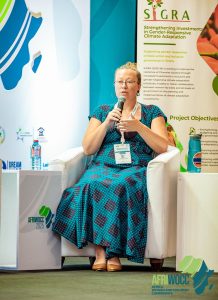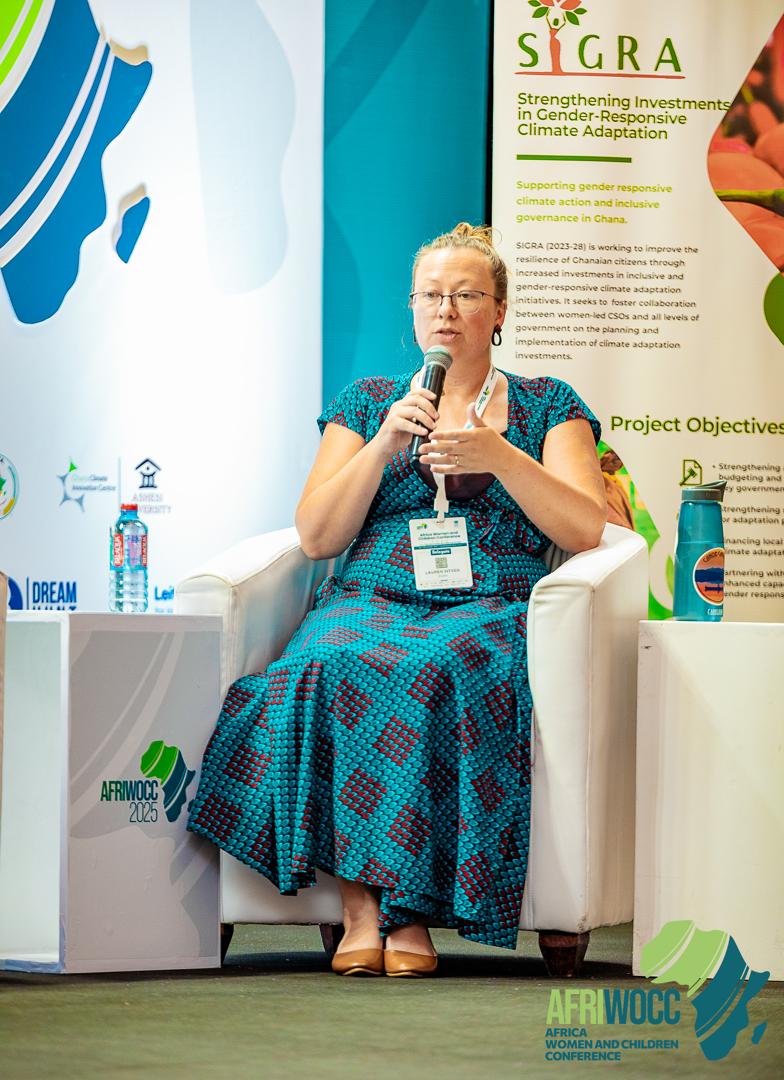
Madam Lauren Intven, Team Lead, SIGRA Project
Accra, Ghana//-The Strengthening Investments in Gender-Responsive Climate Adaptation (SIGRA) project, a Canadian-funded project, has called on Ghana’s government to allocate more funding to climate adaptation in the country.
According to the project, allocating more funding to climate adaptation is the surest way of minimising the harmful effects of climate change, among others.
The Team Lead of the SIGRA Project, Madam Lauren Intven, made the call in an interview with African Eye Report during the last day of the four-day Africa Women and Children Conference 2025 held in Accra.
She noted that the Adaptation Fund is looking at how much money across the world is spent on adaptation versus mitigation.
“Adaptation is always spent by governments themselves, while mitigation is financed by private partners and donors. Adaptations are governments’ own funded initiatives”, Madam Intven explained.
But here in Ghana, we just had the cash initiative, which was announced in the 2025 budget statement, and it was found out that 0.22% of the government budget was going to climate change.
This commitment was made to get it up to 2%. Event 2% is even lower. But I think if we were serious about climate change, it would have been high, she said.
“Because climate change affects us every day, and all the time. So, there is a need to target more funding to climate adaptation, and to make sure that funding is responding to the need of women and those most impacted by climate change”.
The multi-million-dollar project Madam Intven said aimed at improving the resilience of Ghanaian citizens through increased investments in inclusive and gender-responsive climate adaptation initiatives, is being implemented by Cowater International in partnership with the Government of Ghana.
The project works through six key central-level Ministries, Departments, and Agencies (MDAs) aims to promote transparency, accountability, and inclusion, fostering collaboration between women-led CSOs and all levels of government in planning and executing climate adaptation investments.
Funding
“In terms of direct funding, we provide grants, so we provide grants to five Metropolitan, Municipal and District Assemblies (MMDAs) in the Northern and Volta regions. We are investing a total of 140,000 Canadian dollars over three years on each of the five-district assemblies.
So, it is about 40,000 Canadian dollars per year for three years, and the beneficiary district assemblies partner with civil society organisations to implement either one or two projects a year”, she said.
When did the project start?
The project started in 2023, but a lot of the work was capacity building support and technical building systems. So, we just released the first grant of the project to the district assemblies in March 2025, according to her.
Expected impacts to be achieved
At the systems and capacity level, Madam Intven said, “We want to see the plans and budgets of different levels of government actually incorporate gender and climate”.
There is a lot of policy around the employment of women and climate adaptation. But when it comes to the actual plans, the actual budgets, it is hard to see that”.
The project team lead was quick to add: “So, we have been working with the district assemblies. We go out with them, we do climate risk and vulnerability assessments, we ask them to do gender strategies all to build into their plans”.
The project, when successfully implemented, could directly improve the resilience of over six thousand Ghanaians against the effects of climate change, while indirectly supporting over five million people in the Northern and Volta regions of Ghana.


